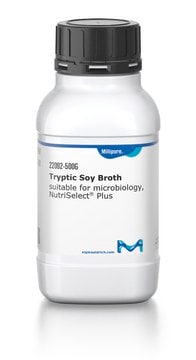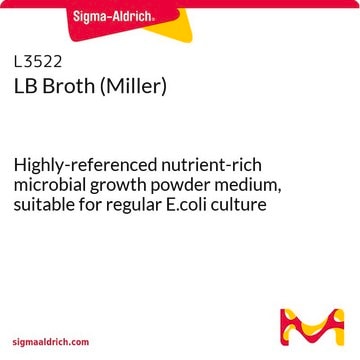70192
Mueller Hinton Broth
suitable for microbiology, NutriSelect® Plus
Sinónimos:
MH Broth; Antibacterial potency testing media; Antimicrobial susceptibility testing media
About This Item
Productos recomendados
sterility
non-sterile
Quality Level
product line
BioChemika
form
powder
shelf life
limited shelf life, expiry date on the label
composition
beef infusion solids, 2.0 g/L
casein hydrolysate, 17.5 g/L
starch, 1.5 g/L
manufacturer/tradename
NutriSelect® Plus
storage condition
protect from light
technique(s)
microbe id | susceptibility testing: suitable
microbiological culture: suitable
final pH
7.4±0.2 (25 °C)
application(s)
clinical testing
food and beverages
microbiology
storage temp.
15-25°C
suitability
nonselective for bacteria (General Media)
Categorías relacionadas
General description
Application
Preparation Note
Footnote
The designations basic, plus, or prime are added to indicate the quality control level, from basic quality control to standard QC plus to prime for full regulatory compliance.
Legal Information
Storage Class
11 - Combustible Solids
wgk_germany
WGK 3
flash_point_f
Not applicable
flash_point_c
Not applicable
ppe
Eyeshields, Gloves, type N95 (US)
Elija entre una de las versiones más recientes:
¿Ya tiene este producto?
Encuentre la documentación para los productos que ha comprado recientemente en la Biblioteca de documentos.
Los clientes también vieron
Nuestro equipo de científicos tiene experiencia en todas las áreas de investigación: Ciencias de la vida, Ciencia de los materiales, Síntesis química, Cromatografía, Analítica y muchas otras.
Póngase en contacto con el Servicio técnico











